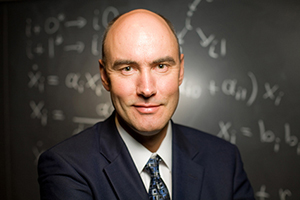Martin Nowak
(Harvard University)
CHAIRE ANDRÉ AISENSTADT CHAIR 2013
Une série de conférences / A series of lectures
Semestre thématique en biodiversité et évolution Mathématiques de la planète Terre 2013 / Mathematics of Planet Earth 2013 Thematic Semester on Biodiversity and Evolution
Conférences dans le cadre de l'atelier "Biodiversité et environnement: perspectives de la théorie de la viabilité et des jeux dynamiques"
Lectures at the Workshop on Biodiversity and Environment: Viability and Dynamic Games Perspectives
LIEU/LOCATION: Centre de recherches mathématiques
Pavillon André-Aisenstadt
Université de Montréal
Salle / Room 6214
DATE: Lundi 4 novembre 2013, 9h00 / Monday, November 4, 2013, 9:00 am
Evolution of eusociality
Aside from games of chance and a handful of textbook topics (e.g. opinion polls) there is little overlap between the content of an introductory course in mathematical probability and our everyday perception of chance. In this mostly non-mathematical talk I will give some illustrations of the broader scope of probability.
Eusociality is an advanced form of social organization, where some individuals reduce their reproductive potential to raise the offspring of others. Eusociality is rare but hugely successful: only about 2% of insect species are eusocial, but they represent 50% of insect biomass. I will present a theory for the origin of eusociality. In the solitary life style all offspring leave to reproduce. In the eusocial life style some offspring stay and help raise further offspring. A standard natural selection analysis determines which of those two reproductive strategies wins for a given ecology. The model makes simple and testable predictions. I will also discuss the limitations of inclusive fitness theory showing that it is a particular accounting method that can be used in special cases, but not in general. Inclusive fitness is to a large extent a conceptual mistake that arises from the unsuccessful attempt to find a universal maximization principle in evolution.
Further reading:
Nowak MA, CE Tarnita, EO Wilson (2010). The evolution of eusociality. Nature 466: 1057-1062.
Une réception en l'honneur du Professeur Nowak aura lieu le 4 novembre, 17h00, au Salon Maurice-L'abbé, Pavillon André-Aisenstadt (Salle 6245)..
A reception in honour of Professor Nowak will take place, November 4, 5:00 pm, at the Salon Maurice-L'abbé, Pavillon André-Aisenstadt (Room 6245).
DATE: Jeudi 7 novembre 2013, 11h40 / Thursday, November 7, 2013, 11:40 am
Evolutionary Dynamics
I will give an overview of simple stochastic models of evolutionary dynamics. The topics of my talk include: constant selection on graphs; suppressors and amplifiers of selection; the isothermal theorem; games in finite populations, on graphs, in phenotype space and on sets; the 1/3 rule for games in well mixed populations and on graphs; the replicator equation on graphs; Antal’s formula for n-strategy games in well-mixed populations; Tarnita’s sigma theorem for structured populations and its extension to n-strategy games.
Further reading:
Lieberman E, C Hauert, MA Nowak (2005). Evolutionary dynamics on graphs. Nature 433: 312-316.
Antal T, A Traulsen, H Ohtsuki, CE Tarnita, MA Nowak (2009). Mutation–selection equilibrium in games with multiple strategies. J Theor Biol 258: 614-622.
Nowak MA, CE Tarnita, T Antal (2010). Evolutionary dynamics in structured populations. Phil Trans R Soc B 365 (1537): 19-30.
GRANDE CONFÉRENCE DU CRM
Conférence s'adressant à un large auditoire
Lecture suitable for a general audience
LIEU/LOCATION: Pavillon Jean-Coutu
Université de Montréal
2940, chemin de Polytechnique,
Salle / Room S1-151
DATE: Mercredi 6 novembre 2013, 19h30 / Wednesday, November 6, 2013, 7:30 pm
The Evolution of Cooperation: Why We Need Each Other to Succeed
During his upcoming Public Lecture, evolutionary biologist Martin Nowak, author of the best-selling book SuperCooperators, will share his cutting-edge research on the mysteries of cooperation. According to Nowak, many problems that challenge us today can be traced back to a tension between what is good and desirable for society as a whole and what is good and desirable for an individual. This conflict is illustrated in global problems such as climate change, pollution, hunger, and overpopulation. Nowak argues that cooperation—not competition—is the key to the evolution of complexity.
La conférence sera suivie d'un vin d'honneur à l'Agora Goodman. / A vin d'honneur will follow the conference

